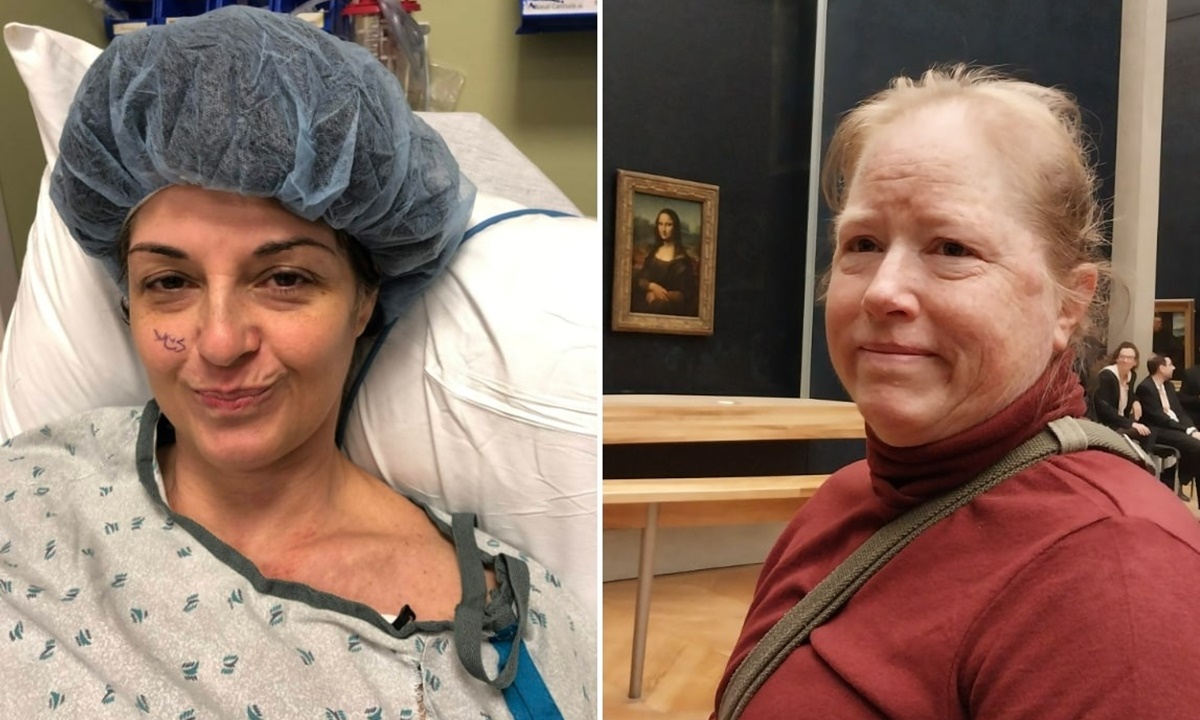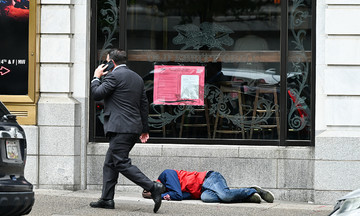In 2009, 52-year-old Jennifer Sontag married primarily for her husband's health insurance. She was struggling with the costs of treating Crohn's disease, a chronic inflammatory bowel condition.
A year later, a ruptured bowel led to emergency surgery and a $20,000 debt. "Even with my husband's insurance, the co-pays and deductibles were so high we couldn't keep up," she said.
The illness forced Sontag, a former clothing store owner in St. Louis and Kansas City, into bankruptcy. Unable to work, she could no longer afford her business expenses.
A few years later, divorced and feeling she had "no other choice," Sontag left the US for China to teach business management, "fed up" with the American healthcare system.
In 2019, a fall from a bus in Shanghai caused a spinal fluid leak, requiring a 5-day hospital stay. Her family persuaded her to return to St. Louis, Missouri, for surgery.
The hospital bill in China was about $1,300. In the US, despite negotiating a lower price, the emergency brain surgery cost around $100,000.
When Sontag explained her inability to pay, doctors suggested setting up a GoFundMe page. "Their advice was, 'You've got to have the surgery, and then you'll figure out how to pay for it'," she recalled. "I thought, 'Are you kidding me? The advice for someone in a medical crisis is to beg for money?'"
 |
Jennifer Sontag (left) and Amy Willard left the US due to the high cost of healthcare. Photo: Washington Post |
Jennifer Sontag (left) and Amy Willard left the US due to the high cost of healthcare. Photo: Washington Post
Sontag is not alone. Many Americans are leaving the country, seeking nations with socialized medicine, universal healthcare, or lower medical costs.
Gerald F. Kominski, professor emeritus at the Fielding School of Public Health at the University of California, Los Angeles, explained, "For people with chronic conditions, middle-class people, lower-income people, this can be a very, very strong motivator to move to a country that has a more comprehensive and also less expensive healthcare system."
According to 2022 data from New York State, over 30 countries have universal health coverage, with many others maintaining socialized or government-subsidized healthcare. "For decades, it's been known that the US has the most expensive healthcare system in the world, however you measure it," Kominski stated.
In a system where most have employer-sponsored insurance, self-employed individuals like Sontag can face periods without coverage. Many are too young for Medicare (for those 65 and older or with disabilities) and too affluent for Medicaid (for low-income individuals).
Even with insurance, financial burdens persist. A KFF survey found that over 40% of Americans have healthcare debt, despite 92% having coverage for all or part of 2023 (US Census Bureau). Experts point out that the US, unlike most developed nations, has no cap on medical debt.
Kominski noted, "Even among the best insured, some individuals will face very large medical expenses, depending on their health condition and how generous their company's benefits are."
Now living in Palermo, Italy, Sontag still carries the $100,000 US debt but accesses Italy's national healthcare system without additional cost. An Italian citizen through her family heritage, she helps Americans with Italian citizenship and visa applications. She estimates that 75% of her clients are leaving the US due to healthcare costs.
Sontag’s business has boomed, especially since President Donald Trump's healthcare policies. She recently expanded her services to Spain.
"I live five minutes from the sea, surrounded by mountains. I can go to the doctor, eat good food without pesticides, and my Crohn's is well managed," she shared. "But I still worry. My mother has Alzheimer's. I can't be with her, but I'm afraid to return to the US without health insurance."
Jason Kim, a 25-year-old cryptocurrency trader from Texas, first encountered a huge medical bill at 19. Unaware of ambulance costs, he called 911 in New York and was diagnosed with jock itch. The bill: approximately $50,000.
Medicaid covered the cost, but the experience deterred Kim from seeking medical care for years. Only after moving to South Korea did he address his skin and GERD issues, easily affording treatment even before his government insurance (available to all residents) kicked in. He now lives in Seoul on a visa based on his Korean heritage.
"I feel like healthcare in the US is a scam," he said. "They charge exorbitant prices, then negotiate down."
Kim left the US due to the cost of quality healthcare for the self-employed and the high cost of living. "I miss America," he admitted. "It's livable if you have the right insurance."
Between 2009 and 2011, 61-year-old Amy Willard survived three bouts of cancer: two breast cancers and metastatic melanoma, which killed her mother.
For 30 years, Willard ran a small cleaning business in Colorado Springs, never earning over $40,000 annually. Her income often left her in healthcare limbo: too high for Medicaid, too low for the $600-800 monthly premiums she was quoted.
Medicaid covered Willard’s 11 cancer surgeries, but only because her illness limited her work to a few hours a week, drastically reducing her income.
As Willard’s health improved and income increased, she lost Medicaid but couldn't afford private insurance, making follow-up care a financial burden.
 |
Medical staff care for a Covid-19 patient at Western Reserve Hospital in Cuyahoga Falls, Ohio, in January 2022. Photo: Reuters |
Medical staff care for a Covid-19 patient at Western Reserve Hospital in Cuyahoga Falls, Ohio, in January 2022. Photo: Reuters
When the Covid-19 pandemic threatened her business, Willard considered leaving, recalling a teenage dream inspired by a French teacher who "brought in croissants and spoke this beautiful language."
She planned a move to southwest France. "As we get older, our health declines, and we need more medical care," she said. "I thought, 'I really can't live here anymore.'"
Now living in Saint-Gaultier, a 4-hour drive from Paris, Willard holds a renewable one-year visa and hopes for permanent residency. She runs an online business from her riverside home.
Local clinic visits cost a fixed $29, with monthly medications around the same price. The "unbelievably reasonable" costs provide comfort, despite lacking comprehensive insurance.
France requires visa holders like Willard to have private insurance for major medical emergencies. She purchased a policy for about $350 annually and applied for the national healthcare system last year.
In June, a 9-day hospital stay for severe anemia and 4 blood transfusions led to a diagnosis of a large gastrointestinal tumor requiring surgery. French medical staff assured Willard that costs were covered by her pending national health insurance card. She hasn't paid for the hospitalization or two ambulance rides.
Willard regrets delaying her hospital visit. "Americans weigh financial ruin against how sick they are," she said. "It's ingrained in us 'poor' people. I almost died."
Vu Hoang (Washington Post, AFP, Reuters)












